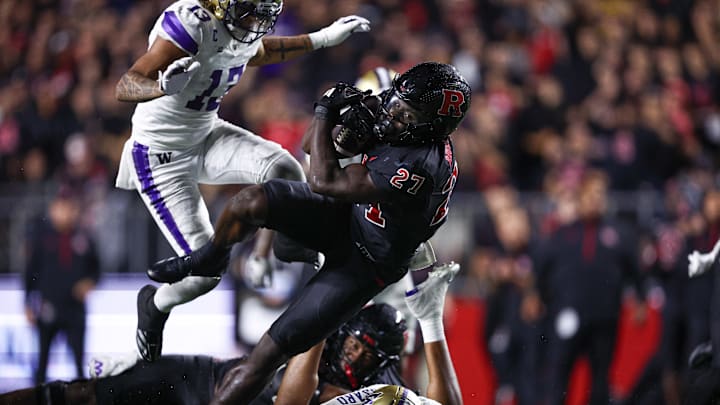While there are some very impressive things to talk about with regards to the Washington Huskies and their move into the Big Ten, there are also a few glaring weaknesses that the Huskies will need to address in the offseason.
Because I have a hard time seeing Steve Belichick and Jedd Fisch finding a way to address the truly concerning trend of Washington’s vulnerability to Big Ten rushing attacks this season. When stacked up against the rest of the Big Ten, Belichick’s run defense is one of the worst in the Big Ten conference this year.
Through five Big Ten conference games, Washington is allowing Big Ten opponents to run for an average of 165 yards per game. Notable examples of this? Well, the Rutgers Scarlet Knights, Michigan Wolverines, Iowa Hawkeyes, and Indiana Hoosiers all had fun on the ground against Washington’s defense.
As a result, Washington ranks at No. 14 in the conference in stopping the run in Big Ten games this year.
Washington Huskies rank at No. 14 in stopping the run in Big Ten games this season
Here’s what that translates over to when compared against the rest of the Big Ten this season:
- Indiana Hoosiers (97.4 yards per game)
- Penn State Nittany Lions (99.2 yards per game)
- UCLA Bruins (107.4 yards per game)
- Ohio State Buckeyes (109.8 yards per game)
- Maryland Terrapins (111.2 yards per game)
- Nebraska Cornhuskers (114.6 yards per game)
- Oregon Ducks (117.4 yards per game)
- Michigan Wolverines (119.6 yards per game)
- Iowa Hawkeyes (132.8.1 yards per game)
- Wisconsin Badgers (145.6 yards per game)
- Michigan State Spartans (147.2 yards per game)
- USC Trojans (147.3 yards per game)
- Minnesota Golden Gophers (148 yards per game)
- Northwestern Wildcats (150.6 yards per game)
- Washington Huskies (165 yards per game)
- Rutgers Scarlet Knights (168.6 yards per game)
- Illinois Fighting Illini (173.8 yards per game)
- Purdue Boilermakers (174.2 yards per game)
There’s a huge gap here between where the Huskies want to be and where they are. Washington had to hastily put a team together through the transfer portal this past offseason. Here’s to hoping that Fisch and his coaching staff are able to address this problem moving forward into next season.
